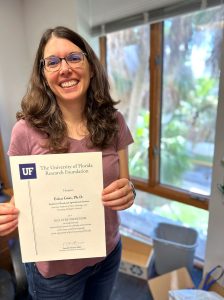By Kirsten Romaguera Rabin, UF/IFAS Communications
Erica Goss is recognized nationally and internationally for her work revealing the causes and effects of plant and crop diseases. She uses genetic markers to track the movement and evolution of plant pathogens across production areas and systems.
Goss was recently named a University of Florida Research Foundation Professor, an honor recognizing the university’s most productive and promising faculty members.
Goss was recruited in 2011 as an assistant professor with a joint position in the Department of Plant Pathology and the Emerging Pathogens Institute. She wants to better understand the factors that contribute to the emergence of destructive pathogens as they evolve in new environments and spread to new hosts.
 “Because the factors that lead to worsening disease epidemics and pandemics are complex — and I work on multiple different plant diseases — I collaborate with colleagues with diverse expertise toward understanding the causes of disease problems to develop potential solutions,” she said. “These could include changes in intercontinental movement of pathogens or local changes in plant host, pathogen or environmental conditions.”
“Because the factors that lead to worsening disease epidemics and pandemics are complex — and I work on multiple different plant diseases — I collaborate with colleagues with diverse expertise toward understanding the causes of disease problems to develop potential solutions,” she said. “These could include changes in intercontinental movement of pathogens or local changes in plant host, pathogen or environmental conditions.”
Her research has been supported by substantial federal grants. Her work on the pathogen that causes bacterial spot in tomatoes revealed a genetically diverse global population and genome-wide changes in populations in Florida. Her approach will continue as she collaborates on a $5.2 million specialty crop research grant from the U.S. Department of Agriculture. Her work on emerging pathogens also revealed an aggressive strain emerging in peppers. Goss is also studying invasive plants as potential sources for emerging pathogens in crops through a collaborative National Science Foundation and USDA grant.
Goss has published 98 peer-reviewed articles in flagship journals, including 40 in the last five years, and has contributed seven book chapters. Since 2018, her work has been cited 2,305 times. She has been honored as recipient of several awards, including the American Phytopathological Society Leadership Institute Fellow, the American Phytopathological Society Schroth Faces of the Future Award, the American Phytopathological Society Syngenta Award, the University of Florida Excellence Award for Assistant Professors, and the University of Florida Term Professorship.
A recipient of the 2018-2019 CALS Innovation in Teaching Award for undergraduate mentoring, Goss has served and chaired committees for more than 50 students.
“COVID infections caused by new variants have perhaps brought greater awareness of the risks of pathogen evolution on human health,” she said. “Plant pathologists are constantly responding to similar waves of pathogen variants that affect plant health.”
 3
3
